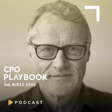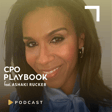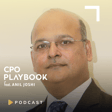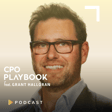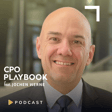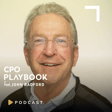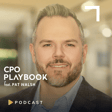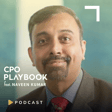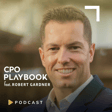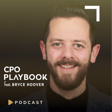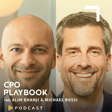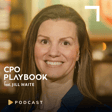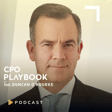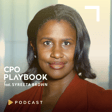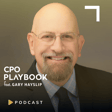Become a Creator today!Start creating today - Share your story with the world!
Start for free
00:00:00
00:00:01

Colleen McCreary on the Future of HR Leadership
Unlock the secrets to the evolving landscape of HR in this exciting episode of CPO PLAYBOOK! Join Felicia Shakiba as she welcomes Colleen McCreary, a Senior Leader at Ribbit Capital and the former Chief People, Place, and Publicity Officer at Credit Karma. Discover how the role of the Chief People Officer (CPO) is shifting from traditional administrative tasks to strategic leadership, emphasizing the importance of employee advocacy and accountability. Colleen shares her thoughts on integrating technology in HR to enhance the employee experience and tackle workforce transition challenges. Don't miss this enlightening conversation that dives deep into the future of HR and the vital role CPOs play in creating thriving workplace cultures.
Transcript
Introduction to CPO Playbook Podcast
00:00:04
Speaker
Hello everyone, I'm Felicia Shakiba, and you're listening to the CPO Playbook Podcast. Join me and my guests as we feature insightful conversations with HR leaders, people scientists, and executives from diverse industries and functions, offering valuable perspectives on the future of work.
Exploring Modern Workplace Complexities
00:00:23
Speaker
Discover a unique outlook on navigating the complexities of the modern-day working world, exploring innovative strategies in talent management and corporate culture from the chief people officer's perspective. Tune in to stay ahead of the game when it comes to all things people related.
Evolving Role of Chief People Officers
00:00:43
Speaker
The Chief People Officer, also known as the CPO, is encountering critical challenges in today's fast-paced business landscape, leading to an unprecedented evolution of the role itself. CPOs must navigate a complex array of obstacles that impede their ability to advocate for employees and secure a seat at the table.
00:01:04
Speaker
These challenges stem from three major obstacles in the workforce today. The first is the long-standing perception where many executives still view HR as a supportive function rather than a strategic one. The second is the rapid pace of technological advancement. As technology continues to transform the workplace, CPOs must navigate the impact of automation, AI, and other emerging technologies on the workforce. And lastly,
00:01:32
Speaker
Managing the aftermath of the pandemic, such as layoffs and calling people back to the office, CPOs must manage these transitions while maintaining employee engagement and morale.
Insights from Colleen McCreary, Former CPO of Credit Karma
00:01:45
Speaker
Joining us today is Colleen McCreary.
00:01:48
Speaker
Colleen is a limited partner at the Operator Collective Venture Fund and the former Chief People Officer of Credit Karma. Colleen is also known for her advisory services for the HBO hit Silicon Valley and her courageous comments on social media. Colleen, thank you so much for being here. Welcome.
00:02:09
Speaker
calling, how have you seen the role of the Chief People Officer, otherwise known as the CPO, evolve over the past decade?
00:02:20
Speaker
It's been interesting the last 15 years in particular. Google really I think deserves a lot of credit for raising the bar for the people experience as a whole and for really changing the game around how companies were valuing employees, not just around compensation, but this idea that the employee experience mattered.
00:02:40
Speaker
And they are technically known as having sort of the first person title chief people officer. The cost of that talent has risen and the impact that those people have been making on companies. There has been a real shift in who is going to help us really build a strategy that will allow us to take, in many cases, our number one expense and create the programs and systems and the tools that are going to make those people more successful, which then make the business successful.
00:03:07
Speaker
and moving it away from the idea of rules and process and command and control, and really seeing this person as not just the internal spokesperson in a number of cases, but also an external spokesperson on who the company is, what their brand is, and what they are standing up for in the world in many cases.
00:03:30
Speaker
and ultimately what this business can become. It's really exploded in the last 10 years, both responsibility, but also the credibility of the person sitting in the seat.
00:03:44
Speaker
So the role transformed from an administrative role to a more strategic position.
Importance of CPOs in Advocacy and Accountability
00:03:49
Speaker
Can you share why sitting at the table is crucial for a CPO? Why not have another executive such as the COO or CFO manage or speak on behalf of HR?
00:04:01
Speaker
Well, I think for a long time, that was the expectation because they are, quote unquote, building the processes or functions around this cost item. You know, if your people are just a line item on a budget, it reported into a CFO and that was functionally where it went. And it was the expected that, you know, the CFOs had these
00:04:23
Speaker
conversations with the CEO and could really be responsible about people from a budgetary perspective. And I think the other place for a while we started to see HR reporting was under the chief legal officer or the general counsel because it was all about managing risk and that people were inherently a risk to the business. So you saw that.
00:04:42
Speaker
And then I think the third path was under sort of a president or a COO because it was, you know, you're supporting the business, so you should report into that business leader and let them be responsible. And I think when you do those things, you're not elevating
00:04:59
Speaker
One side, which is the voice of the employee and having somebody sort of represent what is the employee perspective? How do we think the employees are going to react? And what's that messaging around that? But then on the other hand is who's holding all of these other leaders accountable for how they treat their employees? And certainly it is a partnership always between the CEO,
00:05:20
Speaker
And the CPO, it can't be one without the other. They really need to be simpatico. They gotta be working together. But I think when we've tucked the HR leader underneath a country manager or we've tucked them under a president or those types of things, it really puts that person in an awkward position to have to try and advocate for the right thing or hold that leader accountable for the behaviors and how they're acting as leaders.
00:05:45
Speaker
It's a way better scenario to have that person be a peer. And when you have a challenge or when you are at odds that you can handle that directly as leaders together, just optically for your employee population. I think if you're a company that has said employees are our most valuable resource or the employees are the most important thing, or we care about our employees more than anything else, you don't have somebody who is thinking about your employees all of the time, reporting into your CEO.
00:06:15
Speaker
I don't think any of those statements can really be true. Now you're even starting to see the CPO report to the board of directors, just like the CEO, because there are companies that are saying, I really want to hold not just the whole management team accountable, but I think it's going to be better if the CPO reports to us because we can also hold the CEO even more accountable.
00:06:34
Speaker
I don't necessarily know if that's always going to be the best case scenario. The CEOs I've worked with, and I think there's a selection bias, obviously, for the kind of person I am and who I choose to work with. But almost all five of them that I've worked for over the years would say that they saw me just as their peer or sometimes referred to me as their manager, which I always thought was kind of funny. But I did feel like I had both their ear, but also their trust and support to partner with me to do the right thing.
00:07:03
Speaker
And I think that's up to the individual who's accepting the role. If you accept the role, knowing that it's reporting into the CFO or another business leader, I think that you are accepting that your voice might not be heard in all of the ways that it needs to be. That's incredibly interesting. It seems logical for the CPO to report into the board, given the ethical responsibilities that are naturally baked into it. How might that particular reporting structure impact the business?
00:07:33
Speaker
The amount of responsibility and risk, frankly, that a chief people officer carries certainly drives how the board is going to show up, what decisions they can make and how well informed they are. And it probably has to do with some with how strong the leader or the CEO themselves are, how they are as an operator, how they are in terms of their willingness to make hard decisions and essentially what the business is.
00:08:03
Speaker
It can go in either direction, depending on who the individuals are and the comfort of the board. You know, compensation is a perfect place where I've always worked directly with the head of the compensation committee. And so I always had a voice and a partner on the board. And oftentimes whoever that board member was would ask
CPOs and Compensation Strategy
00:08:20
Speaker
me, how is the CEO doing? What is actually going on? And your trust with that person and your comfort in your ability, if you're reporting into the CEO to really be honest and feel like
00:08:31
Speaker
There's no repercussions for potentially having those conversations might be the same indicator as to whether or not you should be reporting to the CEO or to somebody on the board. So I think you could use that as sort of a litmus test. Frankly, I really want to be able to feel good about the decisions that are being made that directly impact your employees, you know, equity pools.
00:08:53
Speaker
bonus programs, sometimes they get down into the nitty gritty of benefits, overall compensation, and how employees are going to be paid. And what I can actually do or cannot do is often dictated by what the board is deciding. So to some extent, maybe my performance should also be connected to how those board members see me operating.
AI and the Future of HR Roles
00:09:12
Speaker
Given how the role is expanding its breadth alongside emerging technologies like AI, what should CPOs consider when aligning people initiatives with these changes? Certainly right now there's just a ton of chatter around, obviously, AI in particular, and automation in general and what technology can and cannot do. What we've seen is with the emergence of technology, it creates more jobs every single time we've seen an expansion of our economy.
00:09:40
Speaker
as new technologies have come into place. In many cases, the fears are overrun. With HR and AI in particular, there was a really fun tweet a couple of weeks ago that somebody was saying like, oh, this is going to take away 80% of all of HR jobs are going to go away.
00:09:57
Speaker
because of AI and i just i mean i was laughing out loud and then i responded to the tweet and said. I would love if i could come in and automate all of these tactical things you know right regulatory paper work connecting systems that don't talk to each other all of the.
00:10:19
Speaker
The things that I hate that are not strategic and yet are fundamental to obviously being able to function as a business and take care of your employees. That'd be great. It'd be amazing. Please take care of all of that 80%. But the reality at the end of the day is I feel like HR should feel comfortable with a lot of job security if you are in that strategic work that involves truly people and how they operate and function because as we know, each
00:10:46
Speaker
person on this planet is an individual with a different set of values and morals and behaviors. And unfortunately, I don't think they're going to be learning language models that are going to be able to identify every single human's behavior and the decisions that it's going to make and what's going to happen when they make those decisions. So I think that there's a long runway around the need for people to help navigate relationships in the workplace over
Promoting a Learning Culture
00:11:14
Speaker
time.
00:11:14
Speaker
That being said, I do think being in a position where, especially if you work in a rapidly growing industry, like a technology industry or anything that is trying to push the needle or the lens on something as you're building a product, you want to be able to be a first adopter if you can. I love that. I mean, anytime there's a new technology out there.
00:11:37
Speaker
that's going to make it easier for employees make it better for managers make it a more seamless experience so that you can focus actually on the work and the things that you love to do and then our people are here for bring it on but then i think you also bring your workforce along with you. And there's a lot of chatter right now about retraining or rebuilding skills and those kinds of things.
00:11:59
Speaker
And i think that that's sort of a bad framing i think the correct framing is to say what are the things that we can do on the job with our employees that will constantly put them in a learning mode that there's going to constantly be expanding.
00:12:15
Speaker
what their roles are and, you know, sort of going back to some of the things that you may have learned in like the Boy Scouts or the Girl Scouts or the 4-H program or something, which is this idea of learning by doing. That's what you do in these programs growing up in school is learning by doing. And that's what we should be thinking about with our employees is how do we expand their roles? How do we explain their jobs? How do we as leaders create environments where they constantly know that in order to grow themselves and stay relative to the company,
00:12:45
Speaker
They always are going to be learning. It's not just a class that you take or it's not just a training session that you go to. It's this idea that mentally, you're always going to be in this position to be learning. And if you're on a people team, you need to be setting up your programs to support that.
00:13:02
Speaker
And you need to make sure that if you have anti performance reviews but if you have some sort of feedback process or tool or something like that that it's aligning with that same philosophy so that. Your employees know that they're going to constantly be in learning mode that managers are expected to be creating that for employees.
00:13:20
Speaker
And that the business itself is dependent on whether or not people can continue to grow and learn and embrace what's coming to them instead of being scared and afraid.
Managing Layoffs and Remote Work
00:13:29
Speaker
That's all mindset work, but that's the hardest thing to change in a company is getting everybody aligned and then focused on the same mindset.
00:13:38
Speaker
I couldn't agree more about that alignment. I think people underestimate how difficult that is, such as how many people to hire, for example. And a piece of that work can be reflected in the glaring layoffs at companies such as Google, Meta, Microsoft, and many others due to the inability to forecast workforce needs past the pandemic.
00:14:02
Speaker
Today, employees are also being called back to the office after some have migrated to other parts of the country. So how can CPOs effectively manage these transitions of layoffs and returning to the office while maintaining employee engagement and morale? Yeah, this has been a really
00:14:24
Speaker
I would say sad state of affairs for a number of people teams. And the unfortunate reality is that in many cases they weren't the decision makers in both deciding to build these workforce plans. And they're also not the decision makers in many cases to then have to implement some of the business changes that are happening. And then I think the same thing is that many of the people leaders are being expected to react to the winds of the wind and wherever it's blowing in terms of how some of these CEOs and leaders
00:14:53
Speaker
are changing your minds and what to do. So I think number one, if you are a people leader, you have a responsibility to have a voice.
00:15:03
Speaker
in how your workforce expands. And then if the unfortunate reality sets in that you have to cut back, I think you need to think about how that is done and what that means and what are sort of the lingering impacts. And I feel very strongly that workforce planning is a skill that should be practiced year round. I say it's like diet and exercise. 90% of the time you should eat right, eat the right things, fruits and vegetables, don't eat a lot of fried food or fast food. And then also you need to work out on a regular basis.
00:15:32
Speaker
And you need to do the same thing with your workforce. Just be really dedicated and consistent about practicing good behaviors and not just letting people hire because they say they want to hire. Or do you always need to backfill every single job? And if you're in a time of ambiguity, maybe you be patient and run a little lean instead of getting a little heavy. And I usually say a layoff is like a diet drug.
00:15:56
Speaker
that you use the week before a vacation. You're trying to get into that bikini for swimsuit season really quickly and a layoff is the same way that people are trying to hit some sort of earnings target or profit margin at the last minute instead of being really thoughtful year round. So number one, you got to take ownership of workforce planning. Number two is you have to set the tone for how your management team is going to make decisions and how they get communicated. And so
00:16:22
Speaker
I don't think it's acceptable to just sit back and say, well, this decision's been made and we're just going to do it and move on. I think you need to be thinking through and explaining to your management team, what are the repercussions of doing something like a layoff? What's going to happen to your survivors of that layoff and how is productivity going to be managed? And then how do we take care of people?
00:16:44
Speaker
I think one of the things that's really been frustrating as I've watched a lot of these layoffs is Twitter in particular treated their employees so horribly through some of these layoffs in the last year that some of these other companies just said, well, as long as we're not that bad, it's okay for us to lay people off via email or in a giant team's call. And all of that goodwill that they've just built with those employees, whether they'd been there for three months or 30 years,
00:17:11
Speaker
It's gone. And I like to consider myself the old HR lady in the tech space at this point. I've been around for a long time and it's going to come back around that these companies are going to have to hire again and people are going to remember. They're going to remember how they were treated or their friends were treated. And I just don't think there's any good excuse to not treat people well and with dignity and a one-on-one conversation and some of these layoffs. So, you know, I do think it's the people leader role to be educating the rest of the management team on
00:17:39
Speaker
what are good practices and how they could be operated on. And then I think the third thing, which really hits on some of the pulling the rug out from under people who were told you can be revoked, you can work remotely forever and you don't have to come back into the office or whatever the deal was. I do think somebody needs to stand up and say, Hey, unless this is a strategy, which I do think there are a few companies that are changing their minds because they don't want to do a layoff, but it's their way of getting people to
00:18:07
Speaker
potentially have to quit. But if that's your strategy, that's a whole other conversation as well. But I do think we need to look back at who we are and look ourselves in the mirror and say, is this how we treat our people? And is this the expectation? We're changing our minds.
00:18:22
Speaker
on how we're going to operate and work i think you need to give people some time and space to look at their lives and figure out what that time frame is i don't think that you can just say like in two months i need to see you back in the office three days a week and by the way your office is remember three thousand miles away from where you moved.
00:18:39
Speaker
that I told you was okay 18 months ago. So if that's the decision as a leadership team you've made, I think there needs to be, you know, probably a six to 12 month grace period to let people sort of get their lives settled and come back. Because now all you've done is created chaos for people in their lives and they're not productive. And so that whole productivity gains that you're saying you're going to get by people coming back to the office have been completely lost.
00:19:02
Speaker
And I do think employers have a right to decide how they want their people to work. I work for a company that from the day we sent people home during the pandemic because of safety and protection of everybody in society, we said, you're coming back to the office and we never wavered. We told people the entire time.
00:19:22
Speaker
I know other companies are saying it could be remote. I know that there are other places, and you should go work there if that's what you want to do. But we were very consistent on, you're coming back to the office, do not move, do not relocate. This is not okay for us. And I took a lot of backlash and a lot of heat through all of that. I was very unpopular as the messenger. It wasn't just me who decided that, it was a management team lesson, but I was really the messenger of that.
00:19:46
Speaker
But boy, I feel really good that we were so consistent because we were doing what we always said we would do, which is we're going to prioritize making sure that our employees feel like they are clear on their expectations that we're transparent about the decisions that we've made. And then we're consistent about the message that we've given them.
00:20:03
Speaker
And I really think it's just a complete waste of time and disruption and productivity to change the game on people with really no notice or sort of big life planning that you can allow them to do. I just think it's so counterintuitive to the reasons why people are saying, well,
00:20:20
Speaker
It's better if we're in the office. What I would love to see just in general is people get away from these very polarized remote forever or all in the office. I think that there is a range of options that we could be living under, just like I think in general across politics and a number of other spaces where
00:20:39
Speaker
There are no two sides to everything. There's so many shades of gray. We just need to be clear about, you know, what is the lane that we're operating in and why and let people have choices and what, how I want to work today might not be how I want to work in five years from now. And it will be so great if companies could just, you know, decide this is how we operate and then stick to something for a little bit of, for a while instead of just, this is what's popular. This is what the easiest.
00:21:05
Speaker
Um, or this is what I'm feeling today when I woke up and didn't have my coffee. I don't know. I don't know how these CEOs end up in this space where they just flip a switch and say, no, no, no, that remote thing is, I don't believe in it anymore. Today it's all in the office. It just feels like that's what happened. Who knows? But I think people, leaders, you have to have the courage and the backbone, and it is your responsibility and obligation to represent what these behaviors
00:21:35
Speaker
will look like in your organization and how they will take place and to make sure that the rest of the leadership team knows like this is what you're going to have to face.
Courage and Strategic Influence of CPOs
00:21:45
Speaker
Here's the backlash or potential negative consequences of some of these decisions.
00:21:50
Speaker
Colleen, we've talked a little bit about speaking truth to power and having the ability to help leaders in the business make good decisions by having the courage to disagree with them, or at least playing devil's advocate of a specific decision they've fallen in love with. How do you navigate that without risking your own career? Inherently one of the competencies that people need to embrace if they are going to be successful in the sort of chief people officer head of HR
00:22:20
Speaker
is courage. I mean, you really have to, I think you have to embrace courage and conviction in a number of ways. And I think it's helpful too, if you have some values or philosophies that you've agreed upon as a leadership team in terms of how you're going to operate, and you lean on those values or philosophies to help you make those decisions and communicate them. And then you use data, which I think is another super helpful
00:22:44
Speaker
If I look back at some of the things that we've spoken about, you know, around workforce planning in particular, I didn't just start advocating to slow down hiring as things were getting bad or things didn't look good. I was trying to advocate for those behaviors every single day in the processes that we were building, raising the question of are we operating at a highest level efficiency? Can we onboard more than
00:23:11
Speaker
percent of people. Are we onboarding people appropriately? So bringing up this idea that we need to be thoughtful about our employees every step of the journey, not just when things go bad or things are hard. I think you have to have that voice throughout the process to build the credibility and be right, I think, a good percentage of the time when you're advocating for things.
00:23:34
Speaker
So that when things do get really hard and the knee-jerk reaction is we have to do a layoff, that you've earned some credibility to say, let's time out and pause for a minute and let's talk about these things and let's talk about the repercussions and what we're trying to solve for. I really push my HR teams when they're working with managers to really always try and step back and answer that question. Like, what's the problem we're trying to solve? Because a lot of times when you hear something crazy, like,
00:24:04
Speaker
a manager who says, I only want to hire people who went to XYZ school or you hear the, Oh my God, my star person is quitting. We should double promote them and give them some sort of crazy amount of money. All behaviors that we know are dysfunctional and create all sorts of problems. But what's happening is that that leader, they have a problem that they're trying to solve. And so if you
00:24:24
Speaker
take people to step out of the reaction to the solution and say okay let's step back two steps back what problem are we trying to solve here and what is the best outcome we're trying to get to and if you can get people into that i think you're gonna get more shots on goal so to speak you're gonna get more chances to sort of raise ideas.
00:24:45
Speaker
And you're going to have a more open audience to hearing counter ideas or pushing back. I think you have to always be willing to walk away. And that's why I think courage is such an important characteristic. And what do you predict are the future changes to the CPO
Future Growth and Transition of CPO Roles
00:25:01
Speaker
role? It's going to continue to be a strategic partner. I think that that role is going to get bigger and bigger. I think you're going to see more CPOs become COOs. I think you're going to see a continued rotation of
00:25:14
Speaker
people who didn't come up through HR and the people space moving into CPO roles. And I think you're going to see more CPOs taking other business roles. Harvard Business Review a couple of years ago did a really great piece on how CPOs actually would make the best CEOs, which I inherently agree with, of course, selfishly.
00:25:31
Speaker
I think you're gonna see some of that and then think the other changes are your likely. I think you're gonna see some other functions continue to sort of morph into the CPO role. My last CPO role at Credit Karma, I didn't just run people. I also ran all of internal and external comms. I ran social media for the company. I was serving as the chief of staff to the CEO and the management team.
00:25:52
Speaker
I took over security functions and things like that. So as you really pull back on the employee experience, there are a lot of other things that fit into that. I think there are a lot of functions in IT and the experience that employees have in that area. And so I think that role just gets bigger and bigger and it's going to require people to continue to be able to lead with both the vulnerability and the courage.
00:26:17
Speaker
but also with understanding the business as the core of what we do and why we do it and best people leaders are the ones who are able to take.
00:26:26
Speaker
everything that the business is trying to move forward from a customer perspective or business metrics opportunity and a revenue perspective and really tie in your people programs to make sure that those things really are working together and that people buy it. At the end of the day, a lot of being a people leader is about great storytelling and great branding and making sure that the rest of leadership team is doing that together. What's important for the executive team to know about this role?
00:26:52
Speaker
Number one is you have to align on what the goals are for the organization and make sure that you're both aligned on those things. And sometimes really good management teams have that, you know, what the business goals are or what everybody's working towards. And then frankly, what the guide rails are in terms of budget and what you can accomplish and those, those types of things. That's a great management team. It's a good starting place. Not everybody has those. So if you don't have those, you may have to individually do that with each of your partners as people leader.
00:27:20
Speaker
I think number two is there needs to be a mutual respect for what each other is trying to achieve and what they say you're operating from. And what I mean by that is I've had many a leader who think I'm just like an order taker. And so you have to restart all over again and say like, okay, that's not my function. That's not my job. I had one executive at a prior company who tried to come in and tell me that I need to be doing a bunch of things that I thought were my CEO's jobs. And I was like,
00:27:48
Speaker
I don't know where you learned that or what you got that, but that's not my job. So if you have a conversation about compensation that you want to have about your compensation, he is determining that compensation. He is your manager, not me. I can give him some guidance on what the metrics look like. And as we operate as leadership team, but I don't just sit here and write down a number and let you have that number. Oh, sorry. But sometimes you just reframe those conversations and start over with people as to what you're there for.
00:28:17
Speaker
And then I think it's about trust and can you keep that trust? And I would always be with my peers in particular, I would say like, this is stuff that we can keep just the two of us and we can work on or what have you. This is stuff I'm going to have to bring to our CEO and talk about.
00:28:33
Speaker
because I never wanted someone surprised if their CEO was going to come back to that person. I think you need to set up some operating guidelines on how you're going to work. And then I think my other piece of advice for people, leaders and managers and leaders is that I refuse to spend my time on people who don't value it. So if you really don't want my help and you don't want my advice and you don't want my team working with you, that's fine. I'll take my toys elsewhere and play with them and it will be at your own
00:29:00
Speaker
despair that that happens. I mean, we still obviously do the things that help employees, but I think if you're really good at your role, you're going to have a lot of demand for your services. It just takes a little while. So you have to be patient. Colleen, this has been wonderful. Thank you so much. That's Colleen McCreary, Limited Partner at Operator Collective Venture Fund and former CPO at Credit Karma.
Conclusion and Call to Action
00:29:34
Speaker
If you like today's podcast, we have more podcasts on innovative HR strategies, talent management, organizational culture, and more, and how to navigate the complexities of modern day HR. Find them at CPOplaybook.com slash podcasts or search CPO Playbook on Apple podcasts, Spotify, or wherever you listen. Thanks for listening to the CPO Playbook podcast. We'll be back with a new episode next time.
00:30:04
Speaker
I'm Felicia Shakiba.
00:30:08
Speaker
If you love CPO Playbook, the best thing you can do to support us is become a subscriber. You can do that at CPOplaybook.com slash podcast. That's CPOplaybook.com slash podcast. If there's an episode you loved, please share it with a friend. And if you have an idea you would like us to talk about or a guest you'd like to nominate, visit CPOplaybook.com slash contact us to suggest an idea.
